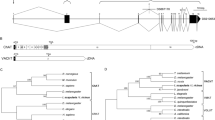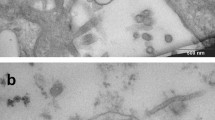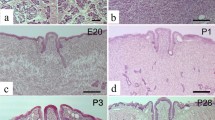Abstract
IN previous literature on the salivary glands of ticks, two types of alveoli have been recognized, namely, the multicellular, granule-secreting and the unicellular, non-granular alveoli. (1, 2, 3) In the multicellular alveoli, two cell types have been distinguished, the ‘Mündungszellen’ with coarse secretory granules and the ‘Funduszellen’ with line secretory granules.(4)
This is a preview of subscription content, access via your institution
Access options
Subscribe to this journal
Receive 51 print issues and online access
$199.00 per year
only $3.90 per issue
Buy this article
- Purchase on Springer Link
- Instant access to full article PDF
Prices may be subject to local taxes which are calculated during checkout
Similar content being viewed by others
References
Bonnet, M. A., C. R. Acad. Sci., 142, 296 (1906).
Douglas, J. R., Univ. Calif. Pub. Ent., 7, 207 (1943).
Robinson, L. E., and Davidson, J., Parasitol., 6, 217 (1913).
Nordenskiold, E., Zool. Anz., 28, 478 (1905).
Author information
Authors and Affiliations
Rights and permissions
About this article
Cite this article
TILL, W. New Cell Types in the Salivary Glands of the Brown Ear Tick, Rhipicephalus appendiculatus Neumann. Nature 184, 1078–1079 (1959). https://doi.org/10.1038/1841078a0
Issue Date:
DOI: https://doi.org/10.1038/1841078a0
This article is cited by
-
Evidence that developmental changes in type III acini in the tickAmblyomma hebraeum (Acari: Ixodidae) are initiated by a hemolymph-borne factor
Experimental and Applied Acarology (1988)
Comments
By submitting a comment you agree to abide by our Terms and Community Guidelines. If you find something abusive or that does not comply with our terms or guidelines please flag it as inappropriate.



